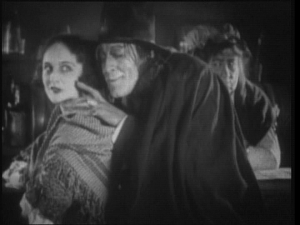
Robert Lewis Stevenson was one of those rare good writers lucky enough to be famous in his own time. I may not like Treasure Island but a lot of people do and even more did at the time of its original publication. They got Stevenson over his inevitable Sophomore Slump (a Romance named Prince Otto that not even English teachers read anymore) and on to The Strange Case of Dr. Jekyll and Mr. Hyde.
Among English language horror classics it has the benefit of being short and Stevenson’s Presbyterian countryman immediately seized on it for a parable for sin, full stop. Using it in sermons as A Cautionary Tale without the slightest of Spoiler Warnings helped to make the book a best seller. Stage adaptions sprang up immediately, becoming their own worldwide sensation. At least five film versions preceded this one, two of which are lost to us by the time of this writing.
So why ignore the three we have in favor of 1920’s Dr. Jekyll and Mr. Hyde? Well, because this is the one I own. And it’s the one with John Barrymore in the title role(s). His name recognition alone should make up for everything…including the film’s problems. Great casting has carried it down through the decades but it shares more with Thomas Russell Sullivan’s stage adaption than with its Stevenson’s novel. Making this a prime example of how Adaption Decay bowdlerized good stories long before the dawn of cinema, and will probably continue to do so until the sun goes nova. So down your mysterious potion of choice, people. This will probably get depressing.
As anyone who bothers to pick up The Strange Case immediately notices, Stevenson constructed the novel as a mystery, with all the shifting voices, POVs, and stories-within-stories one would expect from his more famous, Mystery writing contemporaries. The kind of thing a young Arthur Conan Doyle might have written before burnout and fan expectations forced him to fall back on formula. The true nature of Jekyll and Hyde’s relationship is supposed to be an eleventh hour Shocking Twist, but that cat escaped its bag before the book even hit stores. Popular discourse would have (and had) lay readers believe The Strange Case is a simple confessional, following what, in the twentieth century, would become known as The Three R Formula: Rebellion, Ruin, and Redemption.
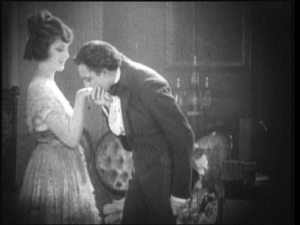
Well, a protagonist can’t Rebel without something to Rebel against, so this Dr. Jekyll and Mr. Hyde takes a good half-hour to establish the cloying, creepy atmosphere of 1880s London, with all the aesthetic trappings you’d expect. Handsome cabs. Fog. Extra-tall top-hats. Fog. Kick-ass overcoats. Fog. Honest-to-Batman cloaks. Kids with no teeth playing in dingy back alleys where they can be easily trampled by maniacs. And fog. Set decorator Charles Seessel and art director Charles Robinson deserve as many props as our main star for recreating all this. Especially if IMDB trivia holds true and they really did build, dressed and film it all in the upper levels of a Manhattan opera house, allowing Barrymore to film during the day and continue his Broadway work at night. It looks more like 1886 than 90% of the green-screen matte painting I’ve seen, and this is one of those rare times where an old film’s damaged print actually enhances the setting. Everything looks fuzzier and grimier, less like ready-built sets and more like found alleys. It does a lot to place me in story’s world even as the visual snaps, crackles and pops reminds me I’m watching a film.
Of course, the story goes out of its way to do that too, as well as reminding us most of our “modern” movie cliches were transplanted whole and bleeding from the Victorian Theater. One-dimensional Love Interests shoehorned into stories that don’t really need them? Check. A strict dichotomy between Good and Evil even when such actively undermines the story being told? This film has it. Protagonists that are so goddamned good it makes the rest of the characters suspicious? Oh yes. Antagonists that are so self-destructively Evil they cease to be frighting and come across as just plain dumb? Of course! All the hits are arrayed here in their Sunday finest, trying their best to make a good impression…so they can bend your daughter over the sofa after you’ve gone to bed.
To this end, Barrymore’s Dr. Jekyll is “the St. Anthony of London,” handing out free health care to the poor like some goddamn socialist. Everyone knows true gentlemen reserve their free time for drinking and smoking cigars! Instead of willing to sin, this Jekyll’s peer pressured into it by his so-called colleagues, including potential father-in-law Sir George Carewe (Brandon Hurst). Not that I blame him: a twenty-one-year-old Martha Mansfield plays Carewe’s daughter, Millicent, and I’d follow her father to any dive bar in Soho if it kept him from opposing our marriage.
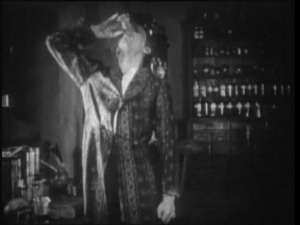
I want to dive into the film and rescue Martha from her bland, lady-in-waiting part, but I also want to rescue her from the freak accident that will claim her life three years after these images are committed to film stock. Either way, she has little to do here, because extraneous love interests never do much, apart from get traumatized. Or die. And if you want ‘fridge stuffing, go read Frankenstein.
Millicent’s father, on the other hand, is a conscious Victorian hypocrite, hitting Our Sheltered Hero with lines like “The only way to get rid of a temptation is to yield to it.” And what can you honestly say to short-sighted, jerk sentiments like that? Jekyll’s Scientific Mind, of course, thinks up nothing…besides the Inciting Question at the heart of all this: What if you could embody those temptations in another form, brought out by a “miracle” of Science and just as easily repressed once your sinning’s done? Wouldn’t that be joyous? A man could freely express all his innermost, base desires…and suffer no consequences. What could possibly go wrong?
Barrymore’s performance is the obvious centerpiece of all this, and the first transformation scene is the obvious centerpiece of his performance. It justly deserves it reputation as a show-stopper, far too good for the movie around it. Certainly puts the other performances in stark relief…but then, acting literally ran in Barrymore’s family. When he got kicked out of prep school for being spotted coming out of a brothel by the wrong person, acting was the family business he fell back on. Even spoiled Rockefeller brats envied him that, especially during his lifetime. I’m not the first to suggest this dual role was perfect one for Drew’s grandfather, though by all accounts he made a pretty good Hamlet, too.
With all that in mind, it should come as no surprise Barrymore does a better job making Jekyll and Hyde feel (nevermind look and act like) two separate people than most movies that cast separate actors in the role(s). A tall motherfucker in real life, Barrymore’s Jekyll is all legs, looking awkward and reedy and the way Washington Irving described Ichabod Crane. His Hyde is a study of purposeful opposites: all knock-kneed and hunchbacked, with strategic make-up and fake fingers extending Barrymore’s naturally rubber face into one of the closest approximations of how Hyde’s described in the novel that I’ve ever seen:
img class=”size-full wp-image-16592″ title=”Meanwhile, in the Negative Zone…” alt=”Meanwhile, in the Negative Zone…” src=”https://aytiws.com/wp-content/uploads/2013/02/djamh-20_7.jpg” width=”300″ height=”225″ /> Meanwhile, in the Negative Zone…“There is something wrong with his appearance; something displeasing, something downright detestable. I never saw a man I so disliked and yet I scarcely know why. He must be deformed somewhere; he gives a strong feeling of deformity, although I couldn’t specify the point.”
Artists of multiple mediums and all down through the ages tended to emphasize Hyde’s bestial attributes, making the werewolf motifs (and no less than Stephen King himself identified the book as the foundation of modern Werewolf fiction in his horror genre survey Danse Macabre) more explicit than they really need to be. Here we have a Hyde who could pass for human, and passes generally unmolested in the dingy alleys of the East End, where he fits in perfectly. He’s not an ape-man, or a man-ape (his two most popular forms), just another broken specimen of urban humanity, his only obvious deformities his hunched back and pointy head. He makes sarcastic tips of his hat a visual gag in themselves. He’s a vision of Jack the Ripper from a time before it became fashionable to suspect Jack was an upper crusty doctor. The gag here being: Jekyll/Hyde actually is an upper crusty doctor, fawning over that dancing girl, taking that prostitute to the opium den in Limehouse, or clubbing that old man to death out in the courtyard.
All of which is well-staged but lacking in forward momentum because the script feels it can get by on shock value, a trap horror movies have fallen into since the first shorts ran through the first Nickelodeon machines. The horror film gives roughly equal time to Jekyll’s goodness and Hyde’s hedonistic excess, both of which are nice to see…but even nice things can get redundant after fifteen minutes. The first scene of the novel doesn’t occur until fifty minutes in because the film spent all that time leading us by the nose. Completely ruining the impact of what is still one of the ballsiest Opening Kills in horror history.
Dickens himself is supposed to have said, “When in doubt, kill a child.” I’d go further and suggest, “That’s how you open a story, not how you open a story’s Third Act.” But I’m not surprised this was a worldwide stage sensation: it’s written for idiots with short attention spans and the simple moral codes of people who lead the most boring lives you can imagine. Is that a poison-bearing ring from the Renaissance on our dancing girl’s finger? Why, yes it is. Here’s a flashback to the Renaissance so you can know what’s what, audience. “Remember this plot device!” the film screams, “it will come into play later!”
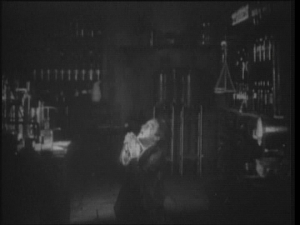
We can’t be trusted to remember things, we audiences. And forget figuring shit out on our own. It’s not enough for us to see a transformation come on without the aid of Jekyll’s potion: we need to see a giant spider (with Hyde’s face) attack Jekyll in bed, only to fade away as Jekyll wakes…transformed into Hyde by “outraged Nature” taking her “Revenge.” Because Nature shits on Klingon proverbs. “Best served cold, my ass,” She says.
The giant spider is a sure sign producer Jon (Wild Wild West) Peters will gain the power to travel back in time soon, assuming he hasn’t already. You could fund a lot of R&D with all that Batman cash and still have enough leftover for a whole fleet of modified DeLoreans. Seriously, though, the giant spider was a pleasant surprise. A potential sign, I thought, of the film striking out of Standard Melodrama Territory into real Psychological Horror. But psychology was not the influence on pop culture in 1920 that it is today. Probably for the best, since most practicing doctors still went on about “hysteria” and “the human soul” as if they were real things.
Much more influential was The Theater, where everything exists so long as the performers sell it. To that end, director John S. Robertson gives everyone in the main cast at least one scene where they’re central to the proceedings – even Jekyll’s long-suffering butler, Poole (George Stevens), who I always feel for the most whenever I see a version of this story. Everyone puts up with Jekyll’s shit but Poole has to literally live with it, the poor bastard. I’m glad he gets a few lines after Sir George’s death-by-caning. I wish he’d had a few more, and the same’s true for John Utterson (J. Malcolm Dunn).
Oh, I’m sorry…you don’t know who that is? Well, let me tell you: Utterson is the original protagonist of this story. Adaptions tend to omit him because he’s far from the most interesting amateur detective in 1880s London. In fact, Stevenson set up an explicit contrast between Utteron’s boring, stay-at-home, I-Drink-Alone lifestyle and Jekyll’s active social climbing. This suggest that Jekyll’s fault lies, not in his Urge to Sin, but in his Urge to Sin Without Fear that Word Will Get Back to Anyone Important. That’s why he creates Hyde: not out of sinful or even Scientific curiosity. Jekyll’s is the sin of Pride, motivated by pure vanity. The potion does not call Hyde down from the ether, but up from Jekyll’s own biforcated soul.
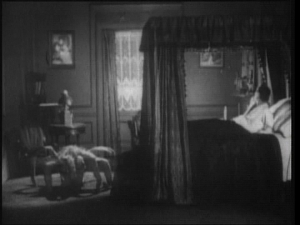
All of which was far too ambitious for this humble production, which turns the ultimate psychological horror story of its age into a cheap morality play. I wouldn’t call it “bad,” it just turned its own story inside out to make things easier on itself, and its audience (supposedly). All the suspense and tension of the narrative’s removed when you squeeze it into this depressingly linear stream. If they’d grafted Stevenson’s pacing onto Sullivan’s play, that might’ve improved things…but, then again, the play was popular. What were they going to do? Commission a new script that wasn’t already a proven crowd pleaser? That might involve risk, and that would be silly.
To be fair, I’m sure director John Robertson or “scenario” writer Clara Beranger would insist they did just that and resent the hell out of any implication to the contrary, sidestepping potential lawsuits. But whom do they think they’re foolin’? I can see stage structure from a mile away, especially when you cast an actor literally raised on the New York scene.
Neither the best nor the worst Dr. Jekyll and Mr. Hyde on the market, 1920’s is a small tree, growing in the shadow of its own headliner. It leaves me wanting more, which is good, but I want the more to be better than what I saw. Audiences would have to wait at least eleven years for that. Thank God I live in the future, surrounded by the “miracles” of Science…including my copy of 1931’s Dr. Jekyll and Mr. Hyde, starring Fredric March.
![]()
![]()
![]()
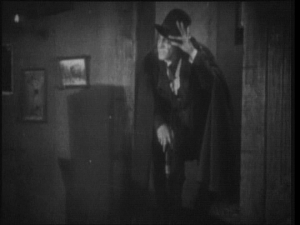

Something that I was delighted to discover, when I set out to read the early classics of Horror and Science Fiction, was how different the actual novels were from their adaptations. Even though I knew the solution to the mystery in this novel, I still enjoyed myself because I hadn’t expected the story to be a mystery. And I didn’t miss the melodrama of the Good Woman and the Fallen Woman that seems to have become attached to so many retellings of this story.
The same journey of discovery kept me reading once I went on my own classics kick around age twelve. As far as Stevenson goes, I went for this over the usual Boy’s Adventure classics, Treasure Island and Kidnapped, because of its tight and relatively bullshit-free construction. An 1880s version of those pot-boiler “thrillers” you see in the supermarket, next to the glossy magazines and the greeting cards. My other favorite of that age, The Invisible Man, could also pass for this, since both have more in common than either could possibly realize.